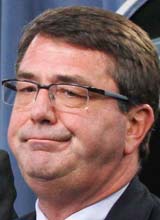
Amid tensions on the Korean Peninsula, US Deputy Secretary of Defense Ashton Carter began a five-day trip to Asia on Sunday, kicking off a series of high-ranking US officials' visits to countries in the region including China.
|
 |
|
Ashton Carter, US deputy secretary of defense, kicked off his visit to Asia on Sunday |
Japan, the Republic of Korea, the Philippines and Indonesia are Carter's destinations in his Asian trip, according to US defense officials, while common security challenges top his agenda for consultations.
In Tokyo, Carter will exchanges views with Japanese officials on the rising tensions on the Korean Peninsula, as well as issues including bilateral missile defense, the Diaoyu Islands and the relocation of US Marines from their Futenma base, the Pentagon said.
In Seoul, Carter will again discuss Peninsula tensions and the US attempt to strengthen its missile defense system. He will also observe the ongoing US-ROK joint-military exercises, American Forces Press Service reported.
Carter will meet Philippine foreign and defense secretaries on Tuesday, and then hold talks with diplomatic and defense policymakers from Indonesia and other member countries of the Association of Southeast Asian Nations.
Carter's visit to Asian countries aims to show Washington's main allies and partners in the region that the US will not change its Asia pivot during the second term of US President Barack Obama, said Jin Canrong, a professor on global affairs at the Renmin University of China.
Carter's visit to Asia comes after US Secretary of State John Kerry chose Europe and the Middle East as destinations for his first foreign visit in February after his swearing-in.
Carter's visit is a step that implements the US pivot toward Asia, said Liu Hui, a researcher on American studies with the Chinese Academy of Social Sciences.
'Offshore manipulator'
By offering support to regional allies and partners, the US hopes to act as an "offshore manipulator" to use more of the allies' strength to deal with disputes in the region, and stay behind the scenes, he added.
One day before Carter's trip, the US said it would bolster defenses against a possible missile strike from the Democratic People's Republic of Korea in the wake of Pyongyang's nuclear threats, AFP reported.
US Defense Secretary Chuck Hagel said that 14 more interceptors would be stationed in Alaska, an increase of about half of the 30 already deployed along the California and Alaska coastlines. The aim is to have them in place by 2017, according to AFP.
The US is always eager to optimize its missile defense system, and Pyongyang's threats offer a good opportunity for Washington, said Liu of CASS.
Following Carter, US Treasury Secretary Jacob Lew will visit Beijing on Tuesday and Wednesday to meet China's new leaders, discuss relations and explore opportunities for cooperation and growth, according to a US Treasury Department announcement.
Lew will "discuss efforts to level the playing field and create new opportunities for US workers and businesses", the statement said.
According to US media, Kerry will also visit China in April as part of an Asian trip, during which he will also visit Japan and the ROK. General Martin Dempsey, Obama's top military adviser as the chairman of the Joint Chiefs of Staff, will also visit China in April.
zhouwa@chinadaily.com.cn